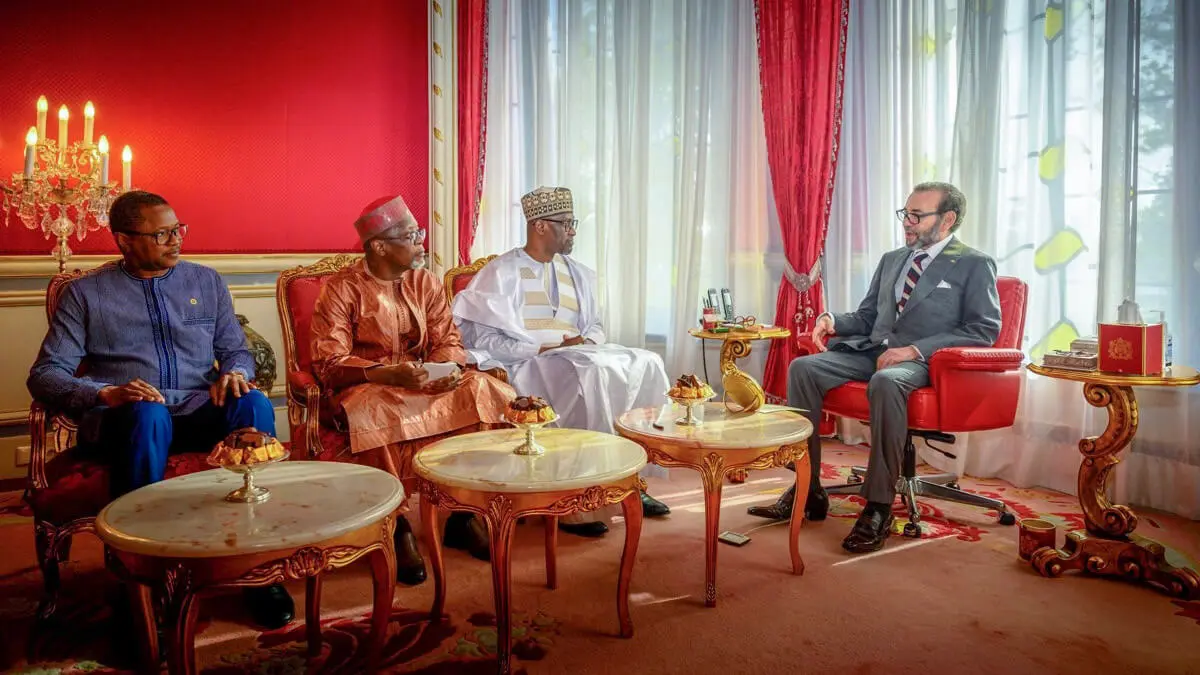The Moroccan Atlantic Initiative: A strategic vision for the development of African countries in the Sahel

Landlocked countries face many economic challenges that place them in a critical position on the global trade map, as they are hampered by high shipping costs that exceed the global average by up to 74 per cent, in addition to long delays in the transport of goods, which can take twice as long as coastal countries. This difficult reality translates into a small share of no more than 1.2 per cent of global trade volume, making the isolation of these countries imperative to ensure their effective integration into the international economic system. In this context, the Atlantic initiative launched by Morocco as a strategic solution aimed at overcoming these obstacles by granting landlocked African countries access to the Atlantic coast opens up new horizons for economic development and regional integration.
In a similar global context, multiple regional and international initiatives demonstrate effective solutions for linking landlocked countries to global markets. In Asia, China's Belt and Road Initiative is connecting countries such as Afghanistan through land corridors to the seas, while in South America, the Mercosur bloc is focusing on connecting Bolivia and Paraguay to the oceans. In Europe, landlocked countries benefit from the European Transport Network (TEN-T). In Africa, the Lupito Corridor is a prominent example of such initiatives, connecting the mineral-rich regions of the Democratic Republic of Congo and Zambia with Angola's Atlantic port of Lupito, underscoring the importance of international cooperation in overcoming geographical challenges. In northern Africa, the Royal Initiative to Promote Access to the Atlantic Ocean for the Sahel Countries is a civilisational project aimed at providing a seaport for the African countries of the Sahel (Mali, Niger, Burkina Faso, Chad) via the Atlantic Ocean, as one of the most prominent landlocked developing countries (LLDCs). These projects, in addition to the Trans-African Land Corridor Network, contribute to promoting regional integration, facilitating the movement of goods between States and ensuring their free access to international waters.
The Royal Initiative to Promote Access for Sahel countries to the Atlantic Ocean represents an investment in our common future and provides a practical model for turning geopolitical challenges into opportunities for cooperation, based on a solid historical legacy and well-established fraternal ties.
With the intertwining of global trade and overlapping geopolitical interests, the Royal Initiative to promote access for Sahel countries to the Atlantic Ocean is emerging as one of the most ambitious and influential strategic visions for the African continent and the world. The Royal Initiative is not just a logistical plan with a technical dimension aimed at facilitating the movement of goods and serving narrow commercial interests. It is a multidimensional transformative project rooted in the common human history of the peoples of the region, which looks to the future and seeks to reshape the map of regional integration in West Africa and the Sahel region through an ambitious vision grounded in reality, seeking to transform geographical challenges into economic opportunities and laying the foundations for South-South cooperation based on common interests and independent sovereignty.
In this sense, it can be said that the Atlantic initiative is nothing more than the culmination of the deep historical and geographical ties that have united Morocco with the countries of the Sahara and the Sahel over the centuries, and is a revival of the ancient civilised corridors and routes between African peoples. Morocco's involvement in the African continent has witnessed a major transformation since King Mohammed VI ascended the throne, as this transformation is characterised by a more open and multilateral strategy, focused on strong South-South cooperation-South, where the potential of the present is invested to address the challenges of the past and the future, starting with the geographical isolation of the Sahel countries, which translates into high logistics costs representing 30-40 per cent of the value of their imports, to modern risks such as extremism, terrorism and climate change.
The Royal Initiative aims to give the unblocked African countries of the Sahel (Mali, Niger, Burkina Faso and Chad) strategic access to the Atlantic Ocean through Moroccan infrastructure. The initiative includes major projects such as the Atlantic port of Dakhla, to be completed in 2028, a road and rail network to facilitate trade, and the Nigeria-Morocco gas pipeline project, all of which aim to strengthen Morocco's position as a key logistics hub in the region. The initiative also aims to make Morocco's road network available to Sahel countries, while estimating the cost of building a comprehensive and integrated multi-dimensional trans-Saharan land corridor connecting Morocco, Mauritania, Mali, Burkina Faso, Niger and Chad, integrating logistics infrastructure (roads, ports, airports, railways) with digital infrastructure (fibre optics), in a way that improves opportunities for innovation and opens new horizons in the fields of e-commerce, transaction facilitation, logistics and communications. I hope it will be called ‘the Mohammed VI Corridor for Continental-Atlantic Linkage’.
In a parallel context, the strategic role of the Foundation of the Emirate of the Faithful, under the leadership of King Mohammed VI, represents a fundamental spiritual, cultural, and civilisational dimension in the Royal Initiative to Promote Access to the Atlantic Ocean for the Sahel States, where its scope extends beyond purely economic and logistical aspects to establish a partnership based on solidarity and mutual trust. Through the framework of the institution of the Emirate of the Faithful, which upholds the values of moderation and restraint, religious and historical ties between Morocco and the peoples of the region are strengthened, creating a solid foundation of spiritual cohesion that is inseparable from economic development. The Emirate of the Faithful plays a fundamental role in achieving spiritual security for the peoples of the region by confronting extremist thinking and destructive ideas through the dissemination of the values of tolerance and peaceful coexistence, thereby ensuring the sustainability of the initiative and its success in achieving its humanitarian and civilisational objectives.
The Atlantic initiative contributes to the consolidation of political stability in the Sahel region, as economic development creates employment opportunities and reduces the motivations for illegal migration and adherence to armed and extremist groups.
At the strategic level, the Atlantic initiative contributes to the consolidation of political stability in the Sahel region by addressing common security challenges, as economic development creates jobs and reduces the motivations for illegal migration and joining armed and extremist groups. At the same time, the initiative is part of Morocco's strategy to establish itself as a ‘regional power’ on the world stage, and is based on the principles of solidarity, integration, mutual respect and mutual benefit.
The Third Conference of Landlocked Developing Countries was held in Turkmenistan from 5 to 8 August 2025, and the Awaza Action Programme (2024-2034) was adopted, focusing on improving infrastructure, diversifying the economy and promoting technology and innovation to help these countries achieve sustainable development. In a related context, the Moroccan Royal Initiative to Promote Access of Sahel Countries to the Atlantic Ocean emerged as a leading model that is fully consistent with the pillars of this programme, providing a practical solution to the problem of geographical isolation and supporting economic development. The election of the Permanent Representative of the Kingdom of Morocco to the United Nations, Ambassador Omar Hilale, as Vice-President of the Conference is an international recognition of Morocco's role and efforts in this area and affirms that the Atlantic initiative represents an effective contribution to the achievement of the objectives of the Awaza programme.
In the same political and diplomatic vein, the African Atlantic Initiative, known as the ‘Rabat Series of African Atlantic States’, launched by Morocco in 2023, constitutes an integrated strategic framework aimed at transforming the Atlantic space into an area of peace and prosperity, strengthening cooperation between African countries bordering the Atlantic Ocean. This initiative is based on three main pillars: political and security dialogue to address common challenges, promotion of the blue economy and maritime connectivity, and cooperation in the field of sustainable development and environmental protection. In doing so, this initiative emphasises Morocco's fundamental role as a bridge linking Africa to the Atlantic world and lays a solid foundation for effective partnership between the countries of the South.
The Royal Initiative to Promote Access of the Sahel Nations to the Atlantic represents today an investment in the common future, offering a practical model for turning geopolitical challenges into opportunities for cooperation, based on a solid historical legacy and well-established fraternal ties, and with international support and recognition. It is therefore not just an economic project, but a comprehensive vision that outlines a more stable and prosperous future for the region and confirms Morocco's position as a key player in achieving regional and international development. The Royal Initiative certainly has a profound historical and civil dimension, as it is a modern revival of Morocco's historic role as Africa's gateway to the world.
Just as the trans-Saharan trade routes were vital arteries for cultural and commercial exchange in the past, from ancient Ghana, Timbuktu, Java, Genie, Kno, Odagust and Touat, to Seglmassa, Aghmat, Marrakech, Meknes, Fez, Ceuta and Tangier, today's initiative is investing in this historical legacy by developing modern infrastructure that connects the Sahel countries with Morocco's Atlantic coast, via the Atlantic port of Dakhla and the Atlantic port of Laayoune, and opens the doors to the world without restrictions.
Al-Buraq Shadi Abdulsalam, Moroccan writer and researcher
Article published in Al Arab

